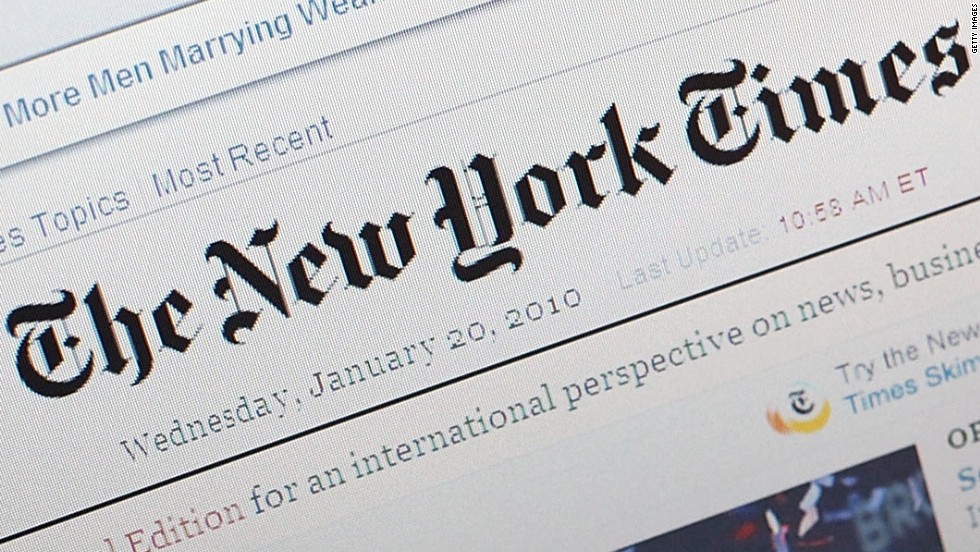The New York Times vs. The Chinese Authorities

The New York Times vs. The Chinese Authorities
Submitted by charlie on Sat, May 07, 2016
Quietly, the New York Times is helping to enable the end of censorship in China, and preparing to take advantage of a free and open media in a post-censorship China. In this regard, they are unique amongst their peers - no other media organization has shown anywhere near the same level of determination. Some might call it stubbornness.
The blocking of the New York Times in 2012 fits well within the pattern of how foreign news organizations get treated in China (see a short history below this story). Soon after the launch of the Chinese New York Times in the summer of 2012, the Times published a story (in English and Chinese) about the personal wealth of Wen Jiabao and quickly found both of theirwebsites blocked.
It is not hard to imagine that in October, 2012, after their sites were blocked, the senior management at the New York Times thought about cutting their losses early and pulling the plug on their Chinese language news effort. Even when the New York Times found that their journalist visas were not being renewed, this hardly affected editorial or the business. The Times actually strengthened their team, hiring journalists who were responsible for some firewall-blocking worthy stories of their own.
The Times recently launched a new Chinese-language product - in print. In May, 2015, they released a publication in Hong Kong and Macau, in simplified Chinese, targeting mainland visitors. The publication includes uncensored news and helps to build their brand with affluent Chinese travelers.
On the launch of this publication, Craig Smith, Managing Director for the New York Times in China, said:
Our Chinese audience has grown enormously through cn.NYTimes.com and we are excited to complement our digital offering by bringing high-quality coverage of world affairs, business and culture to our Chinese readers in print.
The Times have also exploited holes in the great firewall to distribute their uncensored content inside China. In March, 2013 both the New York Times and GreatFire.org news sharing pageson GitHub were attacked by the Chinese authorities.
Most recently, GreatFire has worked with the New York Times to integrate our technique of collateral freedom behind the New York Times Android application. Once downloaded, news stories are constantly updated. No information is censored and because of our advanced circumvention technology, the authorities have not found a way to block the app, or any of our other apps (like FreeBrowser). The authorities back off from taking such action because they understand that this manoeuvre would have considerable negative economic consequences.
Most critical to the Times success in China, senior management have rarely swayed in the face of pressure. Current CEO Mark Thompson said in 2013:
My view is that the New York Times should be seeking to report the entire world objectively and fairly but pursuing stories of public interest wherever we find them - that includes China.
We believe not just for ourselves but for all news outlets. It is in all countries' interest to allow journalists to do their work freely.
In 2012, after the websites were blocked, a Times spokesperson said:
China is an increasingly open society, with increasingly sophisticated media, and the response to our site suggests that the Times can play an important role in the government’s efforts to raise the quality of journalism available to the Chinese people.
Compared to other news outlets or media companies, it is likely that the Times has benefitted from a consistent approach to doing business in China. That approach has been relatively simple. They have have refused to compromise on their principles and have delivered the same message to the Chinese authorities - that by not allowing their content to be accessible by all Chinese the authorities are doing themselves a disservice.
What have the authorities done in response? Seemingly, the authorities have loosened their controls. Late last year Times journalists started to receive visas to work in China again. Could the New York Times be setting the best path forward for news organizations in China?
Disclaimer: GreatFire.org works with The New York Times to deliver uncensored content to audiences in China.
-----
A very short history of news censorship in China
Post-opening up and before the rise of the internet, foreigners who wished to publish in China would have to obtain a local license. Obtaining a license meant paying big bucks, agreeing to self-censorship, losing control over your brand, having no say in day-to-day operations, or a combination of these factors.
The opening of the internet in China presented new opportunities and with it new challenges. Most foreign news organizations were trying to figure out business models at home. A few tried to make inroads into China by publishing news in Chinese. But then the great firewall rose and since then it has simply been a matter of just adding news organizations to the list of blocked websites.
There are always exceptions and anomalies, but the following guidelines apply for the vast majority of foreign news websites in China.
The question of being blocked or not blocked is relatively straightforward. Organizations who do not agree to self-censor their content get blocked. Even organizations that self-censormay remain blocked. Bloomberg falls into this category. If your organization is involved in any major investigative journalism piece that involves the Chinese leadership, your site will get blocked (see ICIJ). It is not just English and Chinese language news sources that get blocked. French (Le Monde), Spanish (El Pais) and content in other languages will also be blocked.
Organizations that have paywalls in place may not be blocked (FT). Those whose websites are unencrypted (http rather than https) may find that the home page is accessible while certain negative stories are not (FT Chinese). But even the authorities are tiring of this approach and are more likely to block entire sites rather than bother with blocking selective stories.
Foreign news organizations that are producing content in Chinese will likely see both their Chinese and English language websites blocked (WSJ, SCMP). Almost all major overseas Chinese language news websites are blocked in China (Boxun, Duowei).


Comments
Post a Comment